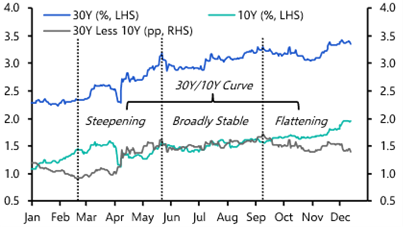Oil has been thrust back into the headlines over the past week following a spike in prices that has taken Brent crude back to around $75pb. As a result, the price of Brent has now risen by 45% from the lows seen at the end of last year. WTI crude is up by nearly 50% over the same period. This raises three questions: what has caused the rise in global oil prices? Will it last? And what are the implications for the world economy?
Our Energy service is the place to look for detailed analysis, but the short answer to the first question is that the rise in prices is the result of a combination of easing concerns about the outlook for oil demand and – perhaps more importantly – growing constraints on the supply side of the market. The outlook for demand has been buoyed by expectations of more accommodative policy by the world’s major central banks, as well as tentative signs of an improvement in economic activity in some of the recent data.
Meanwhile, oil supply has been hit by voluntary production cuts by OPEC and involuntary production cuts owing to US sanctions on Iran and Venezuela. Indeed, the latest spike in prices followed news that Washington will withdraw the waivers from US sanctions on Iran’s crude exports granted to the country’s largest customers. As a result, we have cut our estimate of global supply in 2019 to 100m bpd. Given that oil has significantly outperformed other key commodities over the past few months, it makes sense to think that supply concerns have played a major role in driving prices higher.
As for whether the latest spike in prices will persist, our view is that it won’t. It goes without saying that the supply picture remains uncertain, and it seems unlikely that US pressure on Iran is going to abate. But prices are now at a level where US shale production is likely to crank up. And we suspect OPEC may raise output targets too. More fundamentally, we don’t think the better tone of some of the recent data will herald an upturn in fortunes for the world economy. Our forecasts for global GDP growth remain below the consensus, which is consistent with oil demand undershooting market expectations. Concerns about Iran in particular will help to put a floor under prices, but we still expect Brent crude to end this year at $60pb and WTI to end the year at $55pb.
The most important question, perhaps, is what does all of this mean for the global economy? Notwithstanding our view that the latest spike in oil will prove short-lived, it remains the case that prices are now significantly higher than they were only a few months ago and, even on our more bearish forecasts, will remain above the recent lows recorded at the end of 2018.
In theory, at least, higher oil prices should be bad for global GDP growth. This is because they transfer income from countries with a high propensity to consume to those with a high propensity to save. As a result, higher oil prices tend to represent a squeeze on global demand. However, in practice the recent rally in oil prices has been relatively small compared to previous spikes, and in any case history suggests that at a global level the effects of shifts in energy prices tend to get overwhelmed by other things.
For oil consumers, the hit from higher prices will come in the form of higher inflation, which in turns squeezes real incomes. But as the chart below shows, if oil prices now level off, there will be only a modest and short-lived pick-up in headline inflation in the developed world. Meanwhile, if oil prices fall, as we expect, the pick-up in inflation will be even smaller and more short-lived.
Chart: OECD Consumer Price Inflation (%)

In the emerging world, subsidies tend to blunt the inflationary effects of higher oil prices, but at the expense of a larger fiscal and current account deficits. However, EM current account positions are generally in good shape. So while higher oil prices will intensify the challenges facing a handful of EMs with balance of payments challenges (notably Argentina), it’s difficult to make the case that they will trigger widespread problems.
The upshot of all this is that, while the recent spike in oil has generated a few headlines, it’s unlikely to have a major impact on the prospects for global growth. It adds to the headwinds facing the world economy, but in truth there are much better reasons to expect growth to disappoint over the next 6-12 months.
In case you missed it:
(Requires login)
- Our Senior Europe Economist, Jack Allen, analyses this weekend’s elections in Spain and assesses the prospects for its economy over the next couple of years.
- Our Chief US Economist, Paul Ashworth, casts a sceptical eye over last week’s strong US GDP data.
- Our Latin America Economist, Edward Glossop, picks through the bones of another tumultuous week in Argentine markets.




